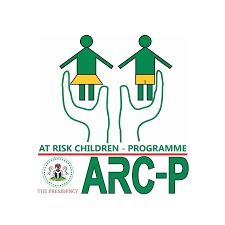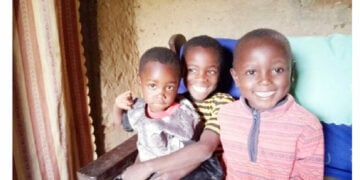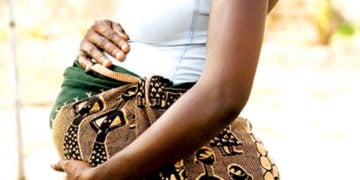In the wake of his second term in office, President Muhammadu Buhari made two pivotal policy declarations to assuage the nation’s concerns regarding the education and welfare of at-risk and vulnerable children. He pledged to lift one hundred million Nigerians out of poverty within a decade, while also ensuring the rigorous enforcement of laws mandating free and compulsory primary education for all children. This vision is in line with the goals of the At-Risk Children Programme (ARC-P).
ARC-P is structured as an initiative with the National Poverty Reduction with Growth Plans (NPRGS). The programme reports directly to the NPRGS Technical Working Group and the Steering Committee, both governance platforms being National in outlook, inclusive of States in terms of implementation. ARC-P contributes to Pillar C (Redistributive Programme) and D (Structural and Institutional Reforms) of the NPRGS.
Ever since its inception in 2021, ARC-P has emerged as a beacon of hope for vulnerable groups across Nigeria. The programme was devised to establish a community of support for the country’s out-of-school and vulnerable children, equipping them with the skills needed to thrive in the social milieu of the twenty-first century. Created as an initiative of the Buhari Administration and directly supervised and coordinated by the Office of the Vice President, ARC-P aims to reform the Almajiri system, educate and train at-risk children, and provide them with opportunities to compete on a level playing field with their more privileged peers across the country.
ARC-P’s pilot projects were launched in Gombe State on June 21, 2021, marking the programme’s inaugural implementation Nationwide, also serving as a model for other States to learn from and emulate. Spearheaded by Maryam Uwais, the Special Adviser to the President on Social Investments, ARC-P has striven to provide a comprehensive solution to the protracted and multi-dimensional deprivations challenging the lives of marginalized youth and children, whilst also extensively documenting the vulnerabilities of children who have been denied social protection and the fundamental privilege of a formal education.
ARC-P places premium on enhancing the capacity of stakeholders in the various States by deploying trained and commissioned facilitators to interim community hubs, where they offer supervisory, mentorship, and tutorial services.
By working closely with these stakeholders, ARC-P not only assures of legitimacy for the programme (particularly in distrustful communities), it also inspires the confidence at grassroot level.
As part of the strategy, the programme recruits young, unemployed, but educated youths that are resident in the Local Government areas of these States. Almost 7,000 youth facilitators, aged between 22 – 40 years, have been trained on the 7 pillars of ARC-P and on other soft skills required for child management and support, such as paralegal services, psychosocial support, child pedagogy, child protection, monitoring and evaluation, safeguarding, mental health, vision screening, security awareness, life skills through sports and curbing substance abuse. After the training, the youth facilitators are expected to go back to their communities to seek for parental consent for a minimum of 50 vulnerable children assigned to each of them within that community, and thereafter continuously engage and mentor them in interim community hubs for transfer of the knowledge and skills acquired.
In Borno State for example, where the impact of insurgency has left a devastating effect on the formal education system, ARC-P has taken up the challenge to educate over 41,000 street children and at-risk youth in the first phase of the programme.
The goal is to provide an enabling environment for these vulnerable children to acquire foundational literacy, numeracy, as well as vocational and life skills that would facilitate their ability to compete favourably with their more advantaged counterparts. The programme also aims to promote peace and social cohesion in the region by addressing the root causes of conflict and promoting social inclusivity.
Last December, at the closing ceremony of a week-3-week capacity-building workshop for the youth facilitators engaged by ARC-P in Maiduguri, Mrs Maryam Uwais stated that ARC-P, “was conceived to support children who are out-of-school and in need of support structures”. She then added that, “there is nobody here that can claim to love these vulnerable children as much as their parents, but these kids have not been exposed to the kind of skills that will enable them to take ownership of their lives and become assets to their families and communities, in today’s world.” ARC-P is set to transform the narrative, positively.
A significant number of these children are left to the mercy of unregulated and poorly structured Almajiri schools. The system has slowly become overburdened due to the widespread poverty that has plagued the country for decades. Unfortunately, these children never got the opportunity to attend conventional schools and, as a result, have suffered from a lack of employable skills and education. However, with the ongoing expansion of ARC-P, there is renewed hope that these vulnerable children will receive the education and training they need to build a brighter future for themselves and their communities.
Having established a strong presence in the North-West, North-East, North-Central, and South-West geopolitical zones, ARC-P is finally venturing into the South-East and South-South regions towards creating a conducive environment for youth and children at-risk to thrive. For a country that has long been haunted by the statistical and documented realities of educationally and socially disadvantaged children and young people, ARC-P provides a glimmer of hope as a solution that can only be provided if all hands are on deck. As the programme continues to grow and evolve, it is hoped that it will be sustained as an effective, comprehensive, and concerted effort from a wide range of stakeholders, aimed at tackling the challenges of vulnerable youth and at-risk children in Nigeria.
–Lemme writes from Abuja.





